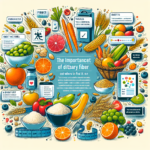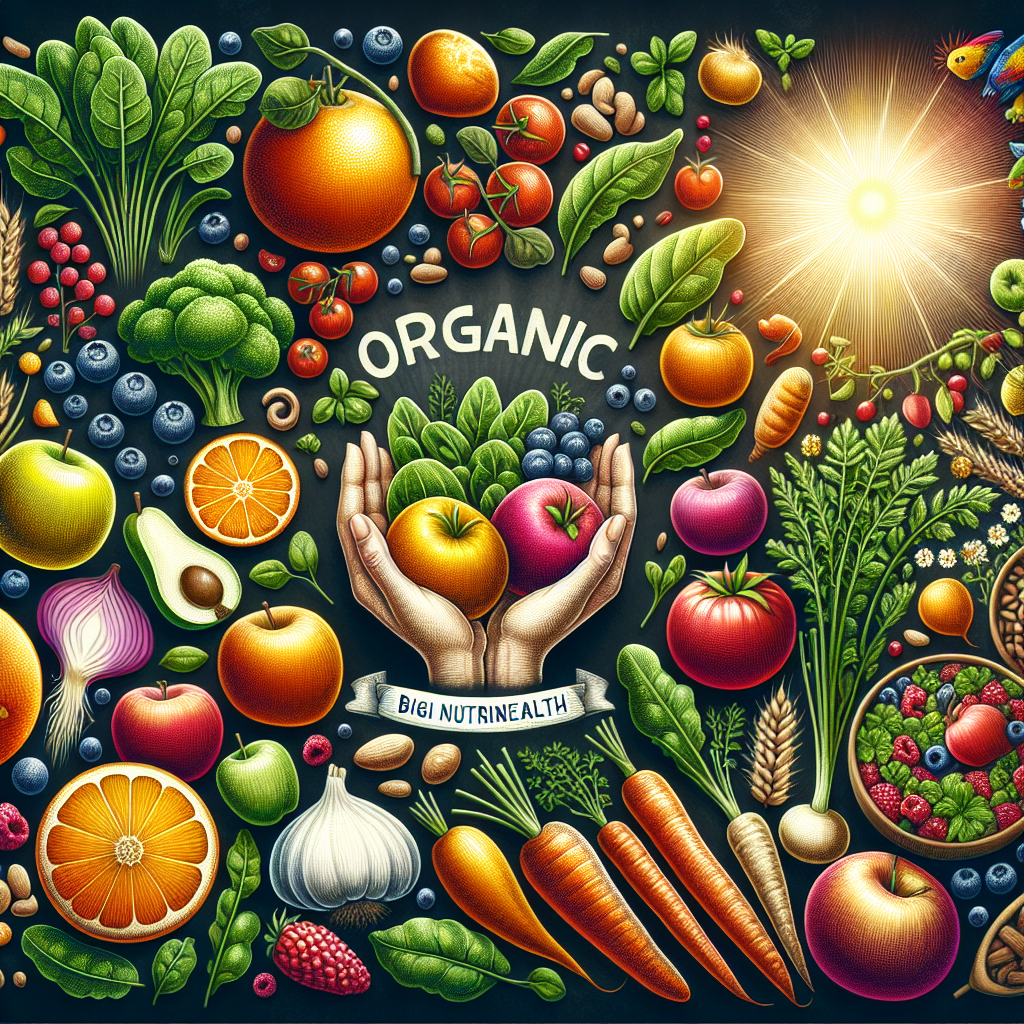Curious about the benefits of eating organic foods? You’re not alone. Many people are looking to improve their overall health through nutrition and want to know if going organic is the way to go. When it comes to a balanced diet, it’s important to consider factors like calorie intake, protein sources, vitamins, and minerals. But what about healthy fats, dietary fiber, and the nutritional differences in organic foods?
These are the questions that arise when we think about the benefits of eating organic. In addition to the nutritional aspect, practical concerns like making healthy choices when eating out, staying hydrated, and reducing sugar consumption also come into play. With all this in mind, exploring the benefits of organic foods is not just about deciding what to put on our plates, but also understanding the value of nutrition education to support a healthy lifestyle. So, let’s dig in and discover if there are indeed any benefits to eating organic foods.
In This Article
ToggleHealth Benefits
Eating organic foods provides higher nutritional value compared to conventionally grown foods. Organic crops are grown in nutrient-rich soils without synthetic fertilizers, which enables them to absorb more vitamins, minerals, and antioxidants. When you consume organic produce, you are maximizing the intake of essential nutrients that are vital for your overall health and well-being.
Organic foods are also rich in antioxidants. These compounds help protect your cells from oxidative damage caused by harmful free radicals. By including organic fruits, vegetables, and whole grains in your diet, you can increase your antioxidant intake and boost your body’s defense against chronic diseases such as cancer, heart disease, and inflammation.
One of the significant advantages of organic foods is that they are free from synthetic pesticides. Conventionally grown crops are often treated with pesticides to protect them from pests and diseases. However, these synthetic chemicals can also pose risks to human health when consumed. By choosing organic foods, you are minimizing your exposure to harmful pesticides and their potential adverse effects on your health.
Furthermore, organic foods are free from genetically modified organisms (GMOs). GMOs are organisms whose DNA has been altered through genetic engineering techniques. While some argue that GMOs can help increase crop yield and enhance resistance to pests, others express concerns about the long-term impact on human health and the environment. By opting for organic foods, you can avoid GMOs and have peace of mind knowing that you are consuming natural, unaltered products.
Improved Environmental Impact
Another significant benefit of eating organic foods is the improved environmental impact. Organic farming practices prioritize sustainable agriculture and aim to minimize harm to the ecosystem. By choosing organic, you can contribute to a healthier planet and a more sustainable future.
Organic farming reduces chemical usage. Unlike conventional agriculture, which heavily relies on synthetic fertilizers and pesticides, organic farming practices utilize natural methods to nourish the soil and control pests. This reduction in chemical usage helps preserve soil fertility, protects groundwater, and minimizes the negative impact on surrounding ecosystems.
Organic farming also promotes biodiversity. By avoiding the use of synthetic pesticides and genetically modified crops, organic farmers create a habitat that supports a wide range of plant and animal species. This biodiversity plays a crucial role in maintaining a balanced ecosystem, including pollination, pest control, and nutrient cycling.
Additionally, organic farming helps decrease soil and water contamination. Synthetic fertilizers and pesticides used in conventional farming can seep into the soil and water sources, polluting them and causing harm to aquatic life and ecosystems. By supporting organic farming, you are actively contributing to the preservation of clean and healthy soil and water resources.
Enhanced Taste and Flavor
When it comes to taste and flavor, organic foods have a clear advantage. The natural ripening process of organic crops allows them to develop their flavors fully. Organic fruits and vegetables are typically harvested at the peak of ripeness, ensuring that they are bursting with flavor and sweetness.
Organic foods also tend to have more robust flavors compared to their conventionally grown counterparts. This is due to the higher nutrient content found in organic crops. The nutrient-rich soil in which organic foods are grown enhances their flavor profile and makes them more enjoyable to eat.
In addition to the enhanced taste, organic foods often have a distinctive aroma that can make the dining experience even more delightful. The natural cultivation methods used in organic farming result in the development of unique scents and flavors that add depth and complexity to meals.
Avoidance of Hormones and Antibiotics
Conventional animal farming often involves the use of hormones to promote growth and antibiotics to prevent diseases. However, consuming meat, dairy, and poultry products from animals treated with these substances can have potential health implications.
By choosing organic animal products, you can avoid the consumption of growth hormones. Organic livestock is raised without the use of hormones, allowing the animals to grow at a natural pace. This eliminates concerns about the impact of hormone consumption on your health and overall well-being.
In addition, organic animal products are free from antibiotics. Conventional livestock is often given antibiotics as a preventive measure or to treat diseases. The overuse of antibiotics in animal farming has led to concerns about the development of antibiotic resistance in humans. By opting for organic animal products, you are minimizing your exposure to residual antibiotics and reducing the risk of developing antibiotic-resistant infections.
Lower Risk of Food Contamination
Foodborne illnesses are a significant concern, and consuming contaminated food can have serious health consequences. Organic foods offer a lower risk of food contamination compared to conventionally grown foods.
The reduced use of synthetic pesticides in organic farming helps minimize the risk of pesticide residues on food. Pesticide residues can contaminate crops and pose a health threat when consumed. By choosing organic foods, you are reducing your exposure to these potentially harmful residues and safeguarding your health.
Furthermore, organic animal products are free from residual antibiotics or hormones. This eliminates the risk of consuming these substances unintentionally and reduces the possibility of adverse health effects.
Support for Local Farmers
Choosing organic foods provides support for local farmers and promotes the growth of small-scale farming. Local farmers often adhere to organic farming practices, prioritizing sustainability and the well-being of their communities. By purchasing their organic products, you are directly contributing to their livelihood and enabling the continuation of traditional and environmentally-friendly farming methods.
Organic farming also encourages the preservation of traditional farming practices. Many small-scale farmers embrace and pass down their knowledge of organic cultivation, ensuring the sustainability of these methods for future generations. By supporting organic agriculture, you are playing a part in preserving agricultural heritage and maintaining the diversity of farming practices.
Additionally, organic farming promotes sustainable agricultural systems. Organic farmers focus on maintaining soil health, conserving water resources, and minimizing waste. These sustainable practices help protect the environment, ensure the availability of nutritious food, and support long-term food security.
Positive Animal Welfare
Eating organic foods aligns with ethical concerns regarding animal welfare. Organic animal farming prioritizes the well-being of animals and promotes enhanced living conditions.
Organic livestock is raised in environments that prioritize animal health and natural behaviors. Animals have access to outdoor spaces, receive adequate exercise, and are provided with organic feed. By choosing organic animal products, you are supporting farming practices that prioritize the humane treatment of animals.
Furthermore, organic farming prohibits the routine use of antibiotics in livestock. This reduces the risk of antibiotic resistance development and ensures that animals are not exposed to unnecessary medications. By consuming organic animal products, you can have peace of mind knowing that the animals were raised in a manner that promotes their well-being and reduces ethical concerns.
Promotion of Food Diversity
Organic farming plays a significant role in promoting food diversity and supporting local and indigenous cuisines. By encouraging the preservation and cultivation of heritage crop varieties, organic farmers contribute to the richness and variety of food options available.
Heritage crop varieties are traditional and unique plant varieties that have been passed down through generations. Organic farmers prioritize their preservation, ensuring that these varieties remain part of our food system. By consuming organic foods, you are actively supporting the conservation of these heritage crops and preserving culinary diversity.
Organic farming also encourages crop rotation. This practice involves alternating the cultivation of different crops in specific fields over time. Crop rotation helps maintain soil fertility, minimize pest and disease risks, and reduce the need for chemical inputs. By endorsing organic agriculture, you are supporting the adoption of sustainable farming techniques that contribute to the preservation of our environment and food diversity.
Potential Health Risk Reduction
Choosing organic foods may reduce potential health risks associated with conventional farming practices. Organic farming methods offer several benefits that contribute to a healthier food system and minimize potential health hazards.
By consuming organic foods, you are lowering your exposure to pesticide residues. Organic farming practices prioritize the use of natural methods for pest control, reducing the need for synthetic pesticides. This helps minimize the presence of pesticide residues on food, reducing potential health risks and ensuring a safer food supply.
In addition, the minimized use of antibiotics in organic animal farming helps decrease the risk of developing antibiotic resistance. Overuse of antibiotics in conventional farming has raised concerns about the emergence of antibiotic-resistant bacteria. By opting for organic animal products, you are lowering your risk of exposure to residual antibiotics and supporting efforts to combat antibiotic resistance.
Furthermore, some individuals may experience reduced allergenicity when consuming organic foods. While not a guarantee, organic foods may contain lower levels of allergenic substances compared to conventionally grown foods. This can be beneficial for those with food sensitivities or allergies, as it reduces the risk of adverse reactions.
Conclusion
In conclusion, incorporating organic foods into your diet offers numerous health benefits, contributes to a healthier environment, supports local farmers, promotes animal welfare, and enhances food diversity. From higher nutritional value and rich antioxidants to improved taste and flavor, organic foods provide a holistic approach to healthy eating. By choosing organic, you are making a positive impact on your health, the planet, and the economy, ensuring a sustainable future for generations to come.
Links: Follow our partner Janser Bob
FAQ: Benefits of Eating Organic Foods
Q1: What nutritional advantages do organic foods offer? A1: Organic foods provide higher nutritional value than conventionally grown foods. They are richer in vitamins, minerals, and antioxidants due to being grown in nutrient-rich soils without synthetic fertilizers.
Q2: How do organic foods impact antioxidant intake? A2: Organic foods are high in antioxidants, which protect cells from oxidative damage and may reduce the risk of chronic diseases like cancer and heart disease.
Q3: Why are organic foods free from synthetic pesticides important? A3: Organic foods are grown without synthetic pesticides, minimizing your exposure to these chemicals and their potential health risks.
Q4: What is the significance of organic foods being GMO-free? A4: Organic foods are free from genetically modified organisms (GMOs), ensuring you consume natural, unaltered products.
Q5: How does eating organic foods benefit the environment? A5: Organic farming practices reduce chemical usage, promote biodiversity, and decrease soil and water contamination, leading to a healthier planet.
Q6: Are there taste and flavor benefits to organic foods? A6: Yes, organic foods often have more robust flavors and distinctive aromas due to their natural ripening process and nutrient-rich soil cultivation.
Q7: What are the benefits of choosing organic animal products? A7: Organic animal products are free from growth hormones and antibiotics, reducing health risks associated with these substances.
Q8: How does organic food reduce the risk of food contamination? A8: Organic farming’s reduced use of synthetic pesticides and absence of residual antibiotics in animal products lower the risk of foodborne illnesses.
Q9: Why is supporting local farmers through organic food choices important? A9: Choosing organic supports local farmers, preserves traditional farming practices, and promotes sustainable agricultural systems.
Q10: How does organic farming align with positive animal welfare? A10: Organic animal farming ensures humane treatment of animals, with better living conditions and no routine use of antibiotics.
Q11: Does organic farming promote food diversity? A11: Yes, it supports the cultivation of heritage crop varieties and practices like crop rotation, enhancing food diversity.
Q12: Can eating organic foods reduce health risks? A12: Organic foods may lower exposure to pesticide residues and antibiotic-resistant bacteria, potentially reducing health risks.
Related posts:
 How can I make healthier food choices when eating out?
How can I make healthier food choices when eating out?
 What are healthy fats and how can they benefit my diet?
What are healthy fats and how can they benefit my diet?
 What is the appropriate calorie intake for maintaining my weight?
What is the appropriate calorie intake for maintaining my weight?
 How much water should I be drinking each day?
How much water should I be drinking each day?
 The Importance of Dietary Fiber and Where to Find It
The Importance of Dietary Fiber and Where to Find It
 What are simple ways to reduce sugar in my diet?
What are simple ways to reduce sugar in my diet?









No comment yet, add your voice below!